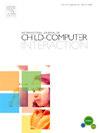青年学习者的适应性元认知提示及其先前表现的作用
Q1 Social Sciences
International Journal of Child-Computer Interaction
Pub Date : 2025-05-02
DOI:10.1016/j.ijcci.2025.100740
引用次数: 0
摘要
元认知提示在基于计算机的学习环境(CBLEs)中有效支持自我调节学习(SRL),从而提高学习绩效。适应性提示作为一种成功地根据学习者的需求定制提示的方法仍然没有得到充分的研究,特别是在初中教育的年轻学习者中,他们被证明处于元认知技能发展的关键阶段。本研究通过自我报告和跟踪数据,探讨了适应性、元认知提示对自主学习活动的影响,以及对学习绩效的影响。在前后实验设计中,72名低年级学生接受提示(n = 38)或不接受提示(n = 34)。结果表明,元认知提示导致较高的自我报告的元认知SRL活动。学习成绩的差异不显著,但先前的学习成绩水平是显著的调节因素。本文讨论了对低成就学习者的SRL研究的启示。本文章由计算机程序翻译,如有差异,请以英文原文为准。
Adaptive metacognitive prompting in young learners and the role of prior performance
Metacognitive prompting has been shown to effectively support Self-Regulated Learning (SRL) in computer-based learning environments (CBLEs) and thereby enhance learning performance. Adaptive prompting as a way to successfully tailor prompts to the learners’ needs remains understudied, especially among young learners in lower secondary education who were shown to be in a critical phase in their development of metacognitive skills. The present study investigates the effects of adaptive, metacognitive prompting on SRL activities through self-reports and trace data, and on learning performance. In a pre-post experimental design, 72 lower secondary students received prompting (n = 38) or no prompting (n = 34). Results show that metacognitive prompting led to higher self-reported metacognitive SRL activities. It did not result in significant differences in learning performance, however, prior performance level was identified as a significant moderator. Implications for SRL research with focus on low achieving learners are discussed.
求助全文
通过发布文献求助,成功后即可免费获取论文全文。
去求助
来源期刊

International Journal of Child-Computer Interaction
Social Sciences-Education
CiteScore
7.20
自引率
0.00%
发文量
73
 求助内容:
求助内容: 应助结果提醒方式:
应助结果提醒方式:


